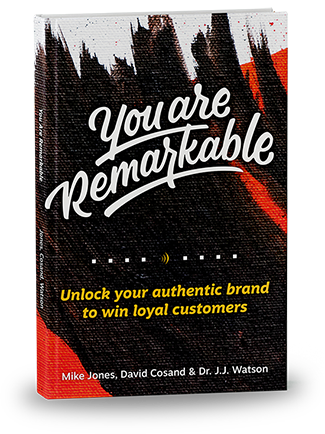Podcast: Play in new window | Download
Subscribe: RSS
Not all brands have a personality, but the ones you remember do.
Walking into a Mcdonald’s is different from walking into a Chipotle. Sprouts feels different from Trader Joe’s. You get a different vibe from IKEA than you do from Bed, Bath, and Beyond. These large corporations have put attention into their brand personality—everything from their name, colors, and logo to their use of space in a retail store. Everything is designed, all the way that people communicate with one another (we’re looking at you, Chick-fil-a).
In most cases, the personality sticks in our minds because it’s consistent… and if it’s consistent for an entire population, a brand’s valuation can soar into the hundreds of millions.
Or much higher than that.
But when it comes to fine-tuning a brand that people can appreciate, trust, and resonate with, you don’t have to be some high-flying, list-climbing conglomerate.
With some sleeves rolled up, and the hard work of figuring out a core purpose that rises above everything else, companies large and small can take seven practical steps to build a brand expression worth remembering, and a brand personality that delivers on its promises.
Time for a Recap:
Our last series focused on some of the ‘don’ts’ of branding.
If you’ve been reading along, then you know all about the precarious terrain of easy-looking solutions—superficial branding, copycat branding, or inventing a brand from scratch.
Like those houses built right on the edge of a cliff, quick fixes start to crumble over time, or whenever the pressure’s on.
Let’s assume you’ve already identified your deep why and sense of purpose as a company, use that to determine your values and vision, which should then go on to shape your goals. With these in mind, how do you nail down the identity of your brand in a way that you can easily communicate to customers, employees, or even the marketing team?
How do people identify your company in a way that matches what you’re really about?
While every organization is unique, we find that seven tools tend to help with brand definition:
- Personality
- Metaphor
- Archetype
- Setting
- History
- Context
- Brand Story
These may not cover every situation, but as far as building a winsome, thoughtful, consistent brand expression goes, they’re toolbox essentials.
Let’s start with our favorite, which is a brand’s personality.
Personality, not Persona
Brands have a personality, just like people do.
And by “personality,” we don’t necessarily mean a persona.
The word persona is a term for the mask worn by a character in a play, or for the character themselves. An actor can slip on a new persona and create a new character at will, if they’re talented enough. If you think about it, many people do just that every day.
That is, they act like a different character in each different aspect of their lives.
Some brands do that too—they have a public-facing persona, an investor-facing persona, an internal-facing persona, or like Lays Potato Chips, Olay, or even Axe deodorant spray, a different persona for specific markets or regions.
The term personality, on the other hand, has to do with those qualities that make something personal, as opposed to impersonal. Personality is what makes me feel like I am dealing with a real person. The concept of a “person” is derived from a persona, but instead of referring to the outward mask, it came to mean the face under it.
The person.
The individual’s fundamental self.
Personality denotes an individual’s nature; the distinct characteristics that make me, me, and you, you. Somebody’s personality is what allows you to recognize them as the distinct person they are, to feel familiar with them, and to have that sense that you really know them.
And if on that level, everyone’s unique and remarkable, the same goes for every organization, company or business.
Like the personality of a complex individual, every brand’s personality starts in the DNA.
So how do you find it?
One of the first things to look for in defining a brand is its personality.
Take a close look at your organization, (with everyone involved and all the insight you can gather)… and ask yourself: How does it act? How does it talk?
How does it look and feel and smell?
Is it’s attitude and mindset serious, silly, or sassy? Settled and stable, or manic and on a mission? Fast or slow, smooth or coarse, traditional or modern, natural or technological?
Again, not every brand has a distinct personality, but the most memorable ones do.
People who have unique, distinctive personalities are hard to forget. People who just seem like copies of people you’ve already met are easy to forget, and the same is true of copycat brands.
They’re forgettable.
Unfortunately, smaller companies are less likely to put energy into their brand, which tends to make them more forgettable. But those which do put energy into how they express their brand personality stand out. You can feel the personality of the brand simply walking around the office or restaurant or storefront. It’s consistent with what you see in their advertising, their email content, and the way someone from the company talks with you.
Unlike a mask or persona, companies with a brand personality give you the sense that you’re seeing or interacting with the person inside… even though they’ve put a lot of time and work into polishing that impression.
For small businesses who lack the resources to refurbish their interiors, splurge on commercials, or purchase swanky new uniforms. Brand personality may look like a stacked deck.
But if you look closely that’s not the case.
The truth is…
When a smaller company shows us its personality, making it memorable and unique, people often prefer this feeling to the feeling they get from a large chain.
A pool cleaning company may not have the opportunity to design a physical space to express its brand. Yet there are still points at which their personality can show—their website and social media, their business cards, the trucks they drive, the invoices they send, or the way they answer the phone.
Smaller companies can benefit from brand personality if they apply one factor—consistency.
Over time, interacting with the same, consistent personality builds a sense of trust.
You don’t trust somebody whose personality changes every day. You don’t trust somebody who seems like they’re hiding something. Trust increases the more you feel like you know their motives.
Similarly, trusting a brand requires being able to see its genuine personality expressed, and through that personality getting a sense of its underlying values and purpose.
If you like the sound of being memorable…
Then tune in next month as we move on to ‘metaphor,’ the next tool in our brand definition and brand expression toolbelt.
Wherever you are in your branding journey, we hope that our notes on ‘persona’ versus ‘personality’ and the central driver of consistency put some wind in your sails.
If we’ve piqued your interest, you might want to pick up our book for more guiding principles of branding like this one. Or stick around and check out more articles, videos, and resources.
You can also subscribe to a monthly newsletter, and get tips and advice on branding strategy and brand development sent in your inbox.
We’re always excited to meet new people.
Like the brands, and B2B companies we help, consult, and fine-tune through our brand workshop process, we know that distinct personalities are a large part of what makes people remarkable.
And if something’s remarkable, then it’s definitely worth sharing.



